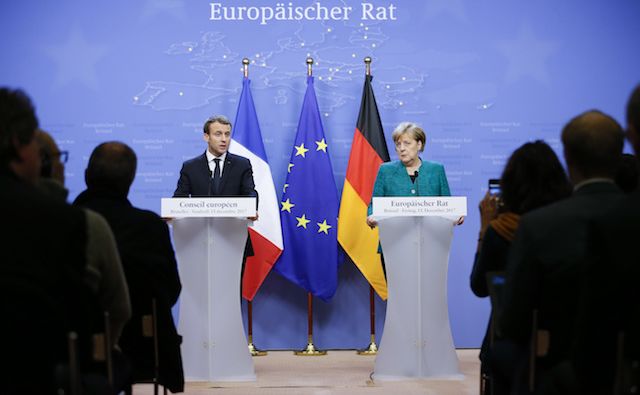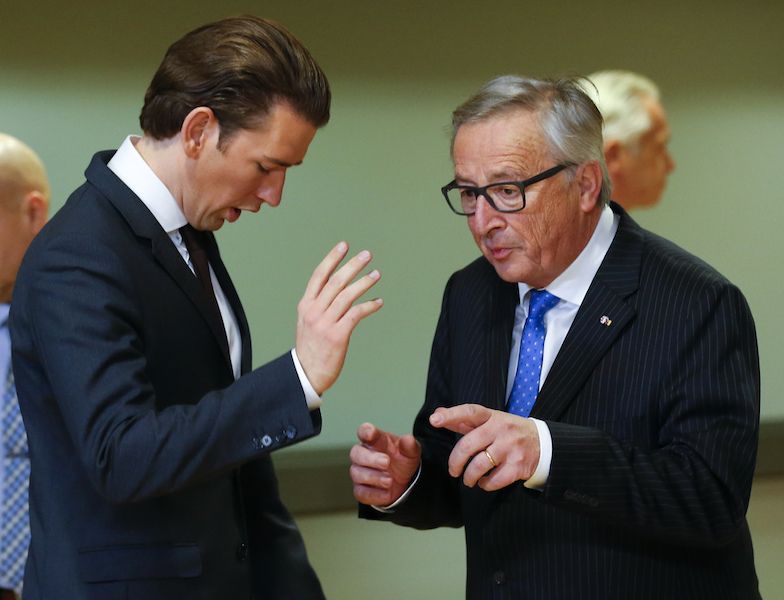2018 Global Outlook: Another challenging year for Europe
The European Union is facing internal and external challenges that will continue to test its leadership in 2018. Politicians will struggle to agree on a reform agenda for the union against a background of tepid economic growth and many other problems. Europe’s outlook is not entirely gloomy, however.

In a nutshell
- The EU will regain self-confidence and pursue consolidation in 2018
- The risks of this process stem from global vicissitudes and the community itself
- Europe’s neighborhood to the east and the south will become increasingly unstable
The new year begins in Europe on a note of cautious optimism. Economic growth, albeit tepid, will continue in the eurozone in 2018 and any lingering fears of the collapse of the European Union, prevalent in past years, will subside. French President Emmanuel Macron will seek to implement his ambitious plans to reform France and the EU with support from the German chancellor, most probably still Angela Merkel. Expectations of a Franco-German grand bargain covering eurozone governance, migration, asylum and border policy will build up ahead of the June European Council.
Amid increasing doubts about United States President Donald Trump’s commitment to NATO allies, new steps will be taken in the field of European security and defense. Projects put in motion under the “Permanent Structured Cooperation” framework (PESCO), which was set up in 2017, will accelerate. Brexit negotiations will move forward fitfully in the first half of 2018, enabling British Prime Minister Theresa May to cling to power and the EU to plan to consolidate the union of the remaining 27 states.
The EU’s General Data Protection Regulation (GDPR) will take effect in May 2018, after four years’ preparation, drawing complaints from tech giants of overregulation and obsession with human rights. Unimpressed, European Competition Commissioner Margrethe Vestager will open new antitrust proceedings against them as part of her campaign for the European Commission presidency in 2019. The Commission will become more vigilant in 2018 on strategic investments from Russia and China.
So, the EU will regain self-confidence and pursue consolidation in 2018, but global risks, the EU’s unstable neighborhood, natural disasters and, finally, the EU itself, will cast ever longer shadows.
Global risks
In 2018, EU decisions will be made against the background of a U.S. withdrawal from international affairs – except where the White House can raise the risk level, as in North Korea and the Middle East. The EU views the Middle East as its backyard. Its interests and aid projects there are vulnerable to increases in tension. China is positioning itself to fill the vacuum left by the Trump administration on security, economic issues, trade, the environment and international institutions. How will Europe handle this in 2018? Will it manage to take a coordinated approach?
EU decisions will be made against the background of a U.S. withdrawal from international affairs – except where the White House can raise the risk level.
The risk of nuclear or conventional war involving the U.S., the key ally of most EU members, and North Korea will grow in 2018. An outbreak of hostilities would put the EU’s internal agenda onto the back burner and probably lead the British government to request that Brexit be delayed. Fresh military conflicts involving proxies of Iran and Saudi Arabia in Lebanon and Yemen, along with the possibility of direct clashes between Iran, Israel and Saudi-led U.S. allies in the Gulf, would sow dissension among member states, preventing joint positions from being adopted under the Common Foreign and Security Policy.
A new intifada in 2018, sparked by President Trump’s decision to move the U.S. embassy to Jerusalem, would destabilize the EU’s southern neighborhood. It could lead to renewed terrorist attacks in Europe, especially following the defeat of the self-styled Islamic State in Syria and Iraq and its rivalry with al-Qaeda.
President Macron will argue that terrorism is Europe’s main security risk in 2018. Security forces will redouble efforts to prevent an attack in Europe on the scale of 9/11. Periodic terrorist irruptions in European cities will produce a public backlash, strengthening support for populist movements and further eroding mainstream political parties.
Neighborhood risks
Europe’s vicinity to the east and the south will become increasingly unstable in 2018.
To the east, some Europeans fear a new cold war with Russia, especially in the Baltic area and the Middle East, the latter prompted by the Kremlin’s opportunistic alliance with Iran. Russian attempts to destabilize western political systems through disinformation and cyberattacks will increase strains with Moscow.
Demagogic Ukrainian opposition leaders will keep the country simmering on the edge of a new popular uprising.
The Minsk Agreement, aimed at an understanding between Moscow and Kiev following the Russian annexation of Crimea and armed intervention in Donbas, will remain stalled. Sporadic outbursts of violence will continue in eastern Ukraine. Measures taken against European companies under the tough new American sanctions law, adopted in August 2017, could prod Germany and other EU countries, especially Austria, to move away from renewing sanctions against Russia, to the dismay of central European and Baltic member states.
The EU will rebuff calls for Ukraine to be given a membership perspective and, together with the International Monetary Fund, which is keeping the country on life support, will press the Kiev government to step up reform efforts. The Czech Republic, Hungary, Poland and Slovakia (the “Visegrad Four”) will call for greater solidarity with Ukraine, claiming its reforms are beginning to bite. Demagogic Ukrainian opposition leaders will keep the country simmering on the edge of a new popular uprising. NGOs will campaign against corruption and state capture in Eastern Europe and the Southern Caucasus, questioning the effectiveness of the EU’s “Eastern partnership.”
Russian military exercises, as well as aerial and naval harassment, will heighten the state of alert in the Nordic/Baltic area, though full-scale Russian military intervention is unlikely. Sweden and Finland will further tighten cooperation with NATO and the first cohort of Swedish conscripts will receive military training in 2018.
Russian presidential elections in March will hold few surprises, except for the extent of public protests at the banning of oppositionist Alexey Navalny’s candidacy. A crackdown on demonstrators would further tarnish Russian President Vladimir Putin’s image, a stain that will not be removed by the glitzy start of the FIFA World Cup in Russia in June.
To the south, the EU will face heightened instability and migration pressures. Following the closure of the Balkan route, most migrants will attempt to reach the EU not from Turkey but from Libya, Egypt and, increasingly, Morocco. The death of ailing Algerian president Abdelaziz Bouteflika in 2018 could destabilize the country and encourage traffickers to use it as an additional departure point for migrants from sub-Saharan Africa hoping to reach Europe.
Germany, Sweden, Italy, France and, increasingly, Spain will be the top destinations for asylum seekers, leading core Schengen countries to maintain border controls. There will be calls to reinforce controls at the EU’s external borders and little support for revamped schemes to share out the reception of asylum seekers among member states.
The exodus of financial services companies from the United Kingdom will gather momentum in 2018.
The rule of law in Turkey will continue to deteriorate next year, together with renewed incursions by Turkish President Recep Tayyip Erdogan into the EU’s internal politics, through appeals to Turkish immigrants and other incendiary statements. Mr. Erdogan, accusing Europeans of complicity with a shadowy terrorist movement and resenting criticism of human rights abuses, may again threaten to walk away from his migration agreement with the EU. Several EU governments, pressured by populist leaders, will call for a formal end to Turkey’s stalled membership talks, followed by accusations of betrayal from Ankara.
Natural disasters
If this were not enough to dampen expectations of a European revival, the risk of natural disasters will grow in 2018. Floods can be expected in Germany, Austria, France, central Europe and the Balkans, with significant risks in the United Kingdom and Ireland. Exceptional storm surges across the continent may lead to deaths, as in 2017.
But more than half the departments – counties – in metropolitan France as well as Spain, Italy and the Balkans will face drought next summer with enhanced danger of destructive fires, damage to agriculture, and the loss of hydroelectric power generation. Spurred by these risks and by the Trump administration’s announcement of its intention to abandon the COP21 Paris climate agreement, NGOs will push the EU to be more demanding with member states that have slipped behind their emissions reduction commitments. Dialogue between the EU and China on climate change, including reduced use of coal and investment in carbon capture, will be stepped up in 2018.
Brexit
The exodus of financial services companies from the United Kingdom will gather momentum in 2018, joined by the first major industrial enterprises. Companies will be unwilling to bet on a “smooth and sensible” Brexit, basing their decisions instead on a worst case, “cliff edge” scenario.
The divorce agreement, hastily concocted in December 2017, could unravel when the EU holds firm on its offer of a limited free trade agreement, instead of the ambitious tailor-made vision, including financial services, championed by British ministers. “Regulatory alignment,” the fallback solution for avoiding a hard border in Ireland seized upon in December 2017, will prove unacceptable to Brexit hardliners, who will see this as backdoor membership of the single market.
The October deadline for concluding the negotiations will be missed and, at year’s end, the Brexit talks will appear to be going down to the wire.
Challenges inside
EU leaders, several facing elections or with weakened authority, as in Germany, will struggle to reach agreement on a reform agenda for the union. The main impulse will come from President Macron, amplified by old-fashioned federalist proposals from Commission President Jean-Claude Juncker. But there will be pushback from fiscal conservatives, suspicious of calls from Paris for “more Europe” if this means a Europe led by France, with Germany and other northern European countries as paymasters. Further French foreign policy initiatives, as on Libya, Syria and Russia, without even minimal EU coordination, would alienate other member states. Several of these, such as the Visegrad Four, the Baltic and Nordic countries, will increasingly caucus together, creating new dividing lines in Europe.
2018 will see parliamentary elections in Italy, Hungary, Latvia, Slovenia and Sweden and presidential elections in Cyprus, the Czech Republic, Finland and Ireland. Local elections in Belgium, the Netherlands, Poland and the United Kingdom will allow governments to test the popular mood.
Despite the return of growth, the popular mood will remain sullen in most of Europe because of persistently high unemployment, especially among young people. In some countries, respondents in their twenties have taken to describing their professional activity as “unemployment.” In 2018, there will be a growing realization that employment will not fall to pre-crisis levels for the foreseeable future because of offshoring and tech-driven improved productivity. This will stimulate more public debate about introducing a minimum income, with resistance by fiscal conservatives.

Economic worries, income inequality, suspicion of globalization and broad-based distrust of the political class will provide fertile ground for populism next year. Populist rhetoric will be strong in parliamentary election campaigns, especially in Italy and Hungary. EU leaders will debate whether to take legal steps or even impose financial penalties on member states accused of violating principles enshrined in the EU’s Charter of Fundamental Rights.
In Italy, the populist Five Star Movement may gain the largest number of votes in the March parliamentary elections. This would gravely unsettle financial markets. Other parties on the right also champion populist causes. Nonetheless, a left-right coalition could emerge after the election, recalling the “historic compromise” between Italian communists and Christian Democrats in the 1970s.
Hungarian Prime Minister Viktor Orban’s Fidesz party is set to retain control of the government in Budapest after parliamentary elections in April or May, ensuring continued friction with the European Commission and European Parliament over respect for human rights and the rule of law. The nationalist Swedish Democrats, who have roots in Swedish fascism, are vying for second place in Sweden’s general election on 9 September and could become the country’s main opposition party.
Negotiations for a coalition government in Germany, following the 2017 federal election, will stretch into the early months of 2018.
The European Commission will pursue infringement proceedings against Poland if it persists in undermining the independence of the judiciary, causing jitters on the eastern flank of the EU and NATO. The EU will also be on the alert for any violation of its fundamental principles in Austria after a coalition government including six senior ministers from the far-right Freedom Party took office.
Separatist pressures are likely to continue in Catalonia, following the December 2017 elections. There will be calls for linguistic rights and a special status in Corsica, after the success of nationalists in the December 2017 regional elections. The performance of the Northern League in the 2018 Italian parliamentary election will provide a gauge of the strength of calls for greater autonomy in the regions of Lombardy and Veneto. The Scottish National Party in the United Kingdom and the New Flemish Alliance (N-VA) party in Belgium will watch separatist movements elsewhere in Europe closely. The main question in 2018 will be whether negotiated devolution can contain secessionist movements.
Negotiations for a coalition government in Germany, following the 2017 federal election, will stretch into the early months of 2018. The outcome may resemble the current grand coalition between the Christian Democrats (CDU-CSU) and the Social Democrats (SPD). In any event, the government ruling Germany in 2018 will be weaker than its predecessor, following the success of the nationalist, far-right Alternative for Germany in the September 2017 federal election. This will make it harder for Chancellor Merkel to serve out a full four-year term for the fourth time and to reach a grand bargain with France ahead of the June European Council on eurozone governance, migration, asylum and border policy.
Outlook
From any angle, 2018 will be a dangerous year in Europe. New hopes of breakthroughs on longstanding national and European dilemmas, raised mainly by the election of a reformist president in France, will contend with risks spilling over from global conflicts, instability in the neighborhood, natural disasters and a less predictable political landscape in the member states. Brexit will be a disruptive process, especially in the UK, but on the continent as well. The impact of these developments will depend on whether the EU, led by France and Germany, can develop a new, reality-based narrative that can win back Europe’s jaded citizens who are tempted by populism.








